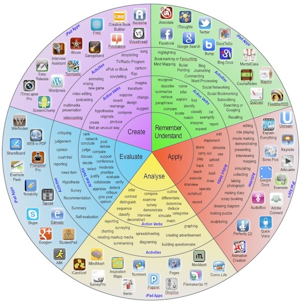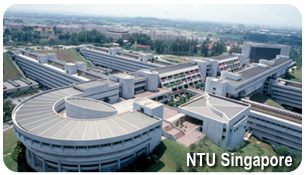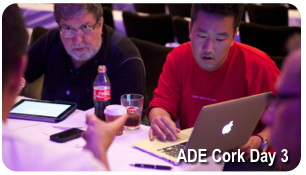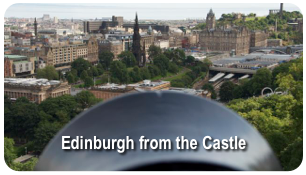Cork minus Four Weeks: About 1995 one of the first pieces of online education jargon I learned was “click brick and click” The idea of starting a learning experience online with the click of a mouse, then meeting face-to-face (the brick), then continue back online with more mouse clicks. It is the concept that influenced the development of blended learning. However I have never really seen it work as effectively as I did with the build up to Cork. A month before the event we started using BaseCamp an online project management tool and putting into practice Challenge Based Learning. We had four big ideas presented and all 234 of us entered into online community discussion to identify the essential questions. The discussion forums were reflective, mind expanding and very active. By the time we arrived in Ireland we had all chosen one of those big ideas areas we were interested in. It was in these communities around a Big Idea where we split into small working groups for the week to define our challenges and make our pitch i.e. presentations.
For years when I travel internationally I do what I call a network crawl where I visit people/institutions with which I have contact, to learn from them and teach into them. This trip to the UK was going to be no different. I contacted some colleagues I have met at some of those conferences, and asked would they like to meet and would they like me to talk about iPads. I never expected the response. Five universities in three countries asked for seven Padagogy Seminars and extra meetings about LAMS. Wow I thought I had better upgrade the iPad seminars we (Ian Green from Adelaide and I) have presented to over 600 participants in Adelaide and elsewhere in Australia.
 Seminar Upgrade: I started with the skeleton of what we did and rebuilt it from the ground up using Keynote as the guiding presentation tool. The seminars by necessity are App centric and because not everyone has an iPad and if they do, nor the same apps the seminars need to be show and tell. Their main function is to present a selection of apps that can be used for L&T. I wanted more than this so I looked to the most well know learning model around the Bloom’s Taxonomy. During the research I found all the great work people have done with Blooms and technology. However I had a interesting new idea of mapping iPad apps to the cognitive domain of the taxonomy and using the Taxonomy Wheel The Padagogy Wheel … it’s a Bloomin’ Better Way to Teach was born. I also identified the need for a third more hands on workshop I will call PADAGOGY 301 which is under development targeted to a more specific audience.
Seminar Upgrade: I started with the skeleton of what we did and rebuilt it from the ground up using Keynote as the guiding presentation tool. The seminars by necessity are App centric and because not everyone has an iPad and if they do, nor the same apps the seminars need to be show and tell. Their main function is to present a selection of apps that can be used for L&T. I wanted more than this so I looked to the most well know learning model around the Bloom’s Taxonomy. During the research I found all the great work people have done with Blooms and technology. However I had a interesting new idea of mapping iPad apps to the cognitive domain of the taxonomy and using the Taxonomy Wheel The Padagogy Wheel … it’s a Bloomin’ Better Way to Teach was born. I also identified the need for a third more hands on workshop I will call PADAGOGY 301 which is under development targeted to a more specific audience.
By Popular Demand: I have learnt from the responses in Padagogy workshops, that academics are very interested in Simon Smith’s e-assessment system of marking assignments. I knew I would get heaps of questions from the floor in Singapore and the UK so I recorded a podcast episode with Simon. Quality Feedback: It’s all about the Students. explains more about this innovative e-assessment workflow using iPads. I mention this in Padagogy 201 and now there is a resource for people wanting more. Its a total win/win for all stakeholders. The teachers save significant time and can enrich the feedback and the students reap the benefit of more personalised feedback.
 Let the Games Begin – First Stop Singapore: The time in Singapore was very productive with four workshops/seminars well attended at the new Lee Kong Chian School of Medicine at the Nanyang Technological University. It is an exciting new joint medical school by Imperial College London and NTU they are developing a very innovative curriculum using LAMS and iPads. The “Padagogy Wheel” created quite a buzz. I presented each of these seminars twice in two days
Let the Games Begin – First Stop Singapore: The time in Singapore was very productive with four workshops/seminars well attended at the new Lee Kong Chian School of Medicine at the Nanyang Technological University. It is an exciting new joint medical school by Imperial College London and NTU they are developing a very innovative curriculum using LAMS and iPads. The “Padagogy Wheel” created quite a buzz. I presented each of these seminars twice in two days
PADAGOGY 101 What’s all the fuss about iPads in HE: This is an introduction to the iPad and contains reference to 29 iPad Apps from Document Readers to Project Management and links to 12 Video tutorials
PADAGOGY 201 It’s a Bloomin’ Better Way to Teach: This seminar gives ideas of the latest use of the Bloom’s Digital Taxonomy and how the iPad can serve the pedagogy. It has reference to 62 apps with 18 video based tutorials.
I had a great interview with Paul Gagnon Director of eLearning at Lee Kong Chian. Collaborative Learning … What No Lectures!: is about how they are taking Team Based Learning and adapting the pedagogy to use iPads and LAMS.
 Next Stop London and a trip down the River Thames: This was a busy time with visits to four universities, but what a way to start, visiting the place where time starts and stops … Greenwich. Simon Walker head of the EDU at Greenwich University had invited me to meet and talk LAMS. When I got there I discovered they were doing some ground breaking work on Graduate Attributes. In the podcast episode Graduate Attributes – Spin or Education Simon talks about the long term initiative the University has to develop their academic skills and framework and push this into a pedagogical framework. How they involve the students and the tools they have developed is worth reflection.
Next Stop London and a trip down the River Thames: This was a busy time with visits to four universities, but what a way to start, visiting the place where time starts and stops … Greenwich. Simon Walker head of the EDU at Greenwich University had invited me to meet and talk LAMS. When I got there I discovered they were doing some ground breaking work on Graduate Attributes. In the podcast episode Graduate Attributes – Spin or Education Simon talks about the long term initiative the University has to develop their academic skills and framework and push this into a pedagogical framework. How they involve the students and the tools they have developed is worth reflection.
Kingston University M25LTG: When invited to present at this event while in London, I had no idea what that meant. We caught the tube and some buses and eventually ended up at Kingston University for the M25 (thats the Motorway) Learning with Technology Users Group. A innovative users group of LT professionals from the  different universities across the wider London area. Note to self – we need to start this in Adelaide South Australia. It was also great to meet Dr Ian Green my fellow ADE from the University of Adelaide while in London – it was unexpected. He joined me in the rest of the visits and seminars.
different universities across the wider London area. Note to self – we need to start this in Adelaide South Australia. It was also great to meet Dr Ian Green my fellow ADE from the University of Adelaide while in London – it was unexpected. He joined me in the rest of the visits and seminars.
Blended PADAGOGY 201 and 101 seminars: were needed at London University and the University College London: Tim Neumann a colleague and good friend from the London Knowledge Lab had organised a 2 hour iPad Seminar at London and another Australian colleague who works for UCL organised one there. Both were well attended and Ian and I did our joint presentation as we always do. The response was very positive.
 Transforming global education: (and learning a bit of Irish) reads the tee shirt we received on our arrival in Cork. Thus began an incredible week of professional learning managed by Apple but the real learning happened in the small groups. The video at the start of this blog entry gives you an insight of what it was like and the visual journey is stunning thanks to the great photos that were taken there and shared by Daniel Woo of the University of NSW. As the saying goes “It ain’t over ’til it’s over!” Everyone who attended the event has committed to work to an October deadline to publish content on the ADE iTunesU. There will be significant curriculum published for the developing of teachers as an outcome of Cork.
Transforming global education: (and learning a bit of Irish) reads the tee shirt we received on our arrival in Cork. Thus began an incredible week of professional learning managed by Apple but the real learning happened in the small groups. The video at the start of this blog entry gives you an insight of what it was like and the visual journey is stunning thanks to the great photos that were taken there and shared by Daniel Woo of the University of NSW. As the saying goes “It ain’t over ’til it’s over!” Everyone who attended the event has committed to work to an October deadline to publish content on the ADE iTunesU. There will be significant curriculum published for the developing of teachers as an outcome of Cork.
Finally Scotland and The University of Edinburgh: This was actually an email type I call “a G’day email” I literally looked up the university website ans found the team running a post graduate elearning course ans said “G’day I’m visiting Edinburgh and  wondered if ….” four or five emails later we had set up a PADAGOGY201 workshop that filled up with registrations in 24 hours from announcement and had a waiting list. They said it was the fastest response they have ever had to an elearning event.
wondered if ….” four or five emails later we had set up a PADAGOGY201 workshop that filled up with registrations in 24 hours from announcement and had a waiting list. They said it was the fastest response they have ever had to an elearning event.
We had a successful seminar and the next day started the marathon journey home. Edinburgh to London… changed planes. London to Singapore overnight no sleep …. thank goodness 4 hours sleep in the airport hotel then back on the A380 now that’s a plane and overnight to Sydney still no sleep… then change planes again and home to Adelaide. Over 48 hours travelling… but it was worth it.

